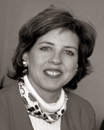 |
 Sarah
Young Fisher is owner of Fisher Advisers, a fee only estate/financial
planning consulting firm, located in Lancaster, Pennsylvania. She
is a consultant who manages individuals' personal and retirement
portfolios - establishing objectives, allocating assets, as well
as guiding individuals' mutual fund portfolios, estate planning
and retirement planning techniques. Sarah
Young Fisher is owner of Fisher Advisers, a fee only estate/financial
planning consulting firm, located in Lancaster, Pennsylvania. She
is a consultant who manages individuals' personal and retirement
portfolios - establishing objectives, allocating assets, as well
as guiding individuals' mutual fund portfolios, estate planning
and retirement planning techniques.
Ms. Fisher is a graduate of Juniata College with a B.S. in Math and Biology,
cum laude, a graduate of the Pennsylvania Bankers Trust School, and the ABA
National Graduate Trust School. Ms. Fisher is a Certified Financial Planner
(CFP), a Chartered Financial Consultant (ChFC) with the American College,
Bryn Mawr, Pa, and a Certified Financial Services Counselor (CFSC), all
national designations in the field of estate planning. She is also an
enrolled agent with the Internal Revenue Service, as well an arbitrator for
the NASD.
Prior employment history includes three years with the Hershey Trust Company
as a trust officer, thirteen years with the Fulton Bank Trust Dept, as a
vice-president and senior trust officer, Lancaster, Pa. as well as being a
financial advisor with a brokerage firm, acquiring both securities and
insurance licenses.
Ms. Fisher is past president of the Lancaster County Estate Planning Council.
She has been a member of the Finance Committee of the Lancaster
YWCA, Treasurer for the Lancaster Day Care Center Board, a
member of the 1990 Leadership Lancaster class, is currently
the President of the Lancaster Chapter of the American Society
of CLU & ChFC, a member of the Eastern Conference Board of
Pensions for the United Methodist Church, and a member of
the Endowment Committee of the Lancaster-Lebanon Council of
the Boy Scouts of America..
Ms. Fisher is author of three books: Everything You Need to Know About Money
and Investing: A Financial Expert Answers the 1001 Most Frequently Asked
Questions about Money, published by Prentice Hall; The Lazy Way to Handle
Your Finances, published by Alpha Books and recently published Complete
Idiot's Guide to Personal Finance In Your 20s and 30s. Ms. Fisher is a
featured financial planner in the May 10, 1999 First for Women magazine.
A mother of two children, Ms. Fisher and her husband reside in Lancaster, Pa.
- What led you to write this book?
As a financial planner and someone who has been in the investment world for
almost twenty years, I've found that people do ask many of the same questions
as they try to understand their money. I felt there is a need to provide
unbiased information in a resource format.
- What do you feel to be the biggest challenge facing women today when
handling their finances?
Understanding the products they are purchasing, knowing how their advisers
are paid, finding a reputable, reliable adviser who understands their needs.
- How has the atmosphere changed for women investors in the last 10
years?
Women are much more independent than 10 years ago. We make more money, more
women are on their own relying on their investment decisions, and these women
feel more comfortable with their decisions.
- How will the atmosphere change for women investors in the next 10
years?
Women's income will continue to increase and become more comparable to men's.
With an increase in disposable income, women will have more to invest. With
this increase in funds, they will become even more independent.
- Where did you start your career and how did it lead you to where you
are today?
I started as a Trust Officer in 1978. It was a wonderful place to learn
investments. I have been a broker/insurance agent, trust officer, tax
preparer and financial adviser. Each step increased my knowledge and helped
be where I am today.
- How much money do you need to start investing?
T. Rowe Price, a Family of Funds, permits an investor to open a mutual fund
with an automatic withdrawal from one's checking account each month. You can
start investing with as little as $50/month! Unbelievable!
- How should a woman get started investing with no investment
experience?
Read, listen to others experiences, and questions your options, then start
investing with a no-load mutual fund company. Understand what you are
buying, and what the results!
- If a woman has debt, at what point should she become an investor?
After one has set aside an emergency fund, then they can begin investing,
It's imperative to have your debts under control -- investing is secondary to
being solvent.
- Have you published any other books before this one? If so, what are
they?
Everything you Want to Know ... is my first book.
- What are your future book writing plans?
I have written a book about finances in your 20s and 30s, and currently
writing a book about starting an Investment Club.
|
|
